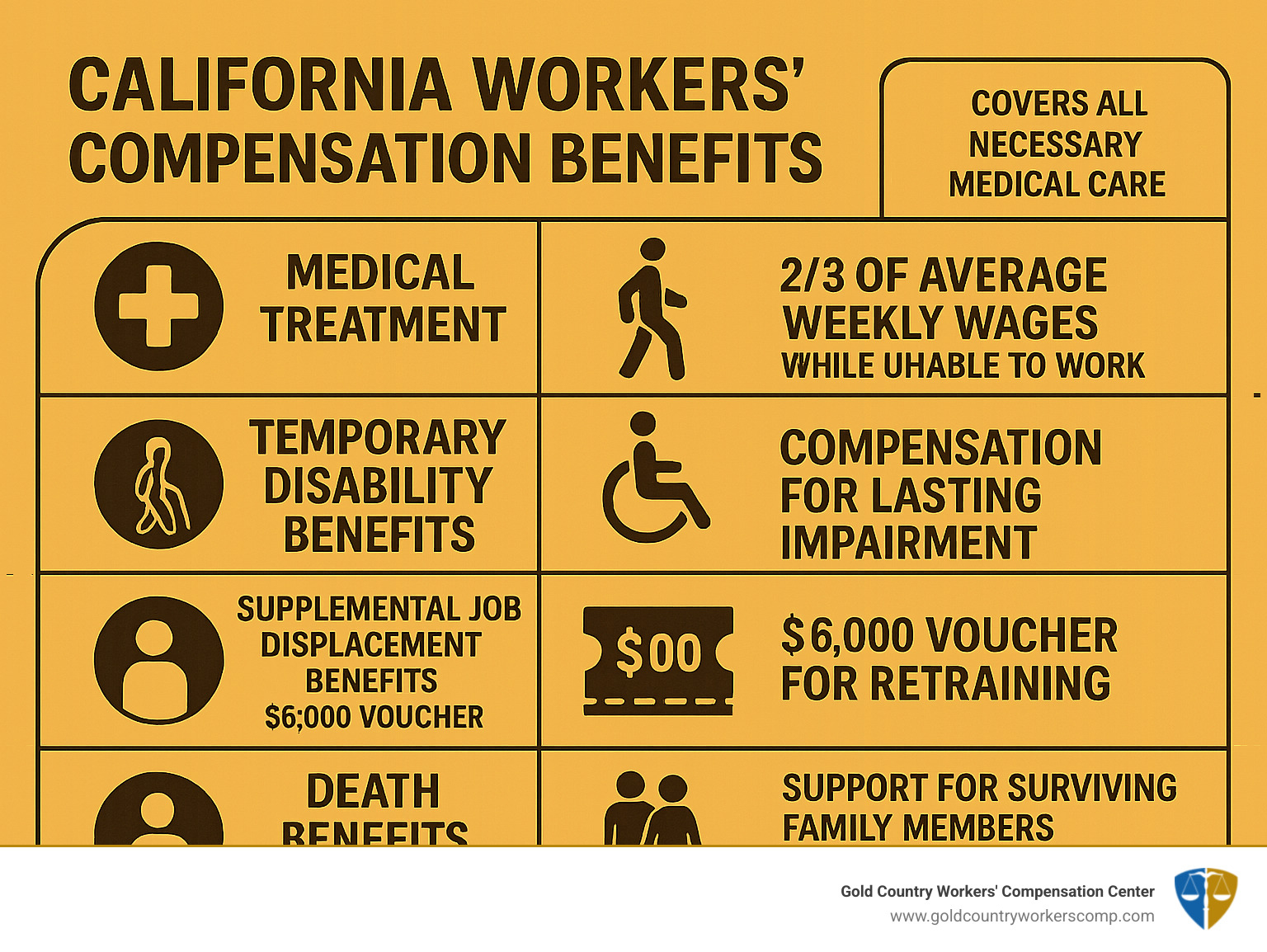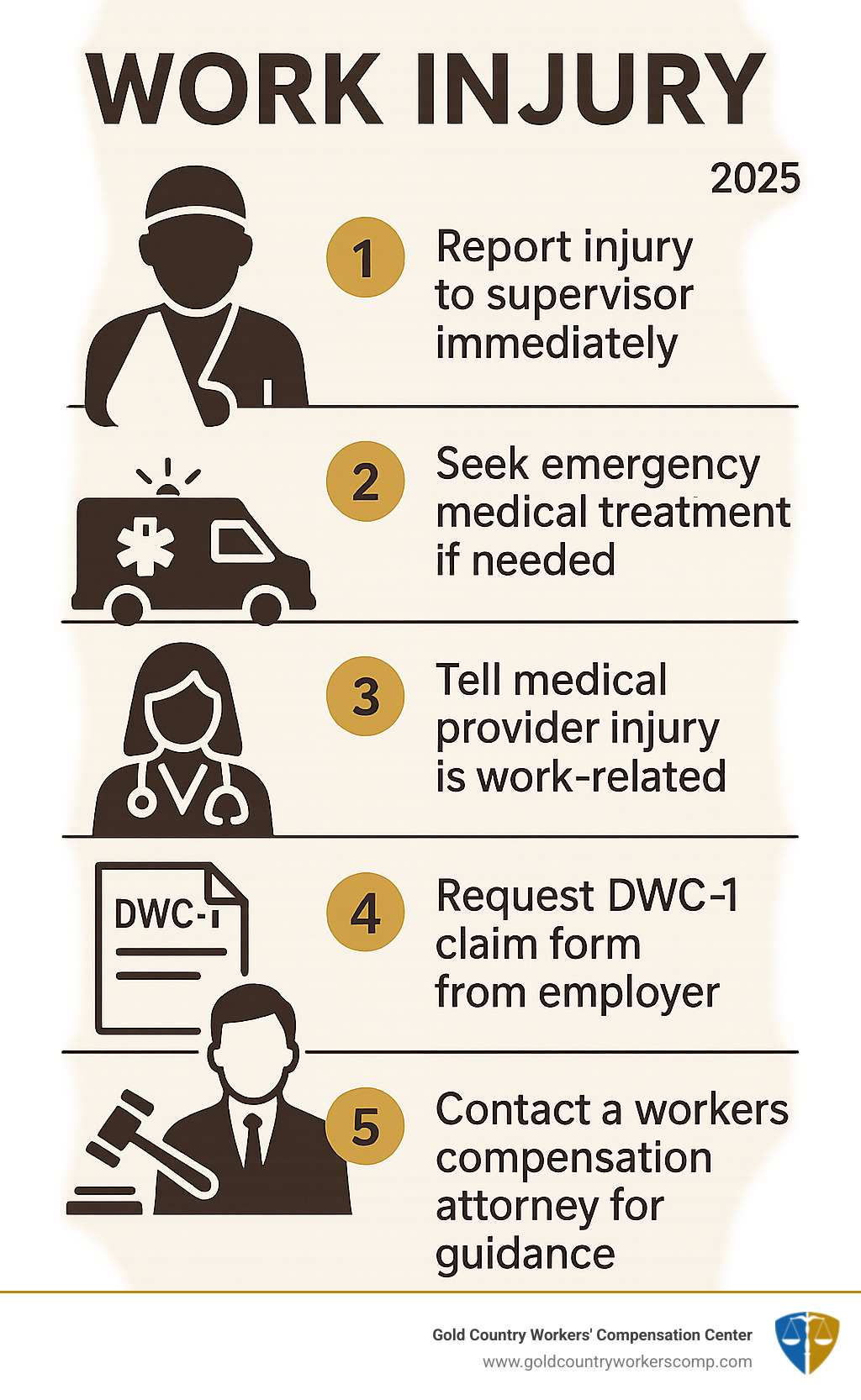Why California Workers Need Specialized Legal Advocacy
When you’re hurt on the job, a California workers compensation attorney can be the key to your financial recovery. While California’s workers’ compensation system is designed to provide no-fault insurance for workplace injuries, navigating its complex rules often requires expert guidance to overcome challenges from employers and insurance companies.
Quick Answer: What You Need to Know About California Workers’ Compensation Attorneys
- Purpose: Help injured workers secure medical care, disability benefits, and wage replacement.
- Fee Structure: Most work on contingency (no recovery, no fee), typically 15% of the settlement.
- Specialization: Look for California State Bar Certified Specialists in Workers’ Compensation.
- Benefits They Secure: Medical treatment, temporary and permanent disability, job retraining, and death benefits.
- When to Hire: Immediately after injury, as a critical 30-day reporting deadline applies.
California law requires all employers to carry workers’ compensation insurance, which provides five core benefits. However, the reality is that insurance companies often use the system’s complexity to their advantage, routinely denying valid claims, delaying payments, and undervaluing settlements.
According to the Bureau of Labor Statistics, millions of work-related injuries are reported each year, leaving many workers to face an uphill battle without proper legal representation. While experienced law firms report high success rates, individual workers often struggle alone against well-funded insurance defense teams.

Understanding California’s Workers’ Compensation Law and Benefits
California’s workers’ compensation system is a no-fault program, meaning you are entitled to benefits if you’re injured at work, regardless of who caused the accident. Every employer must carry this insurance for all employees. However, private insurance companies handle most claims and often prioritize their bottom line over your wellbeing. This is why an experienced California workers compensation attorney is crucial for securing the benefits you deserve.
The Five Core Benefits for Injured Workers
Understanding the five essential benefits helps you know what to fight for.
Medical Treatment: Covers all care needed to heal your injury, including doctor visits, surgery, medication, and physical therapy, based on evidence-based guidelines.
Temporary Disability (TD) Benefits: Replaces two-thirds of your average weekly wages while you recover and cannot work. For most injuries, payments last up to 104 weeks.
Permanent Disability (PD) Benefits: Compensates you for lasting physical limitations that affect your earning capacity after you have healed as much as possible.
Supplemental Job Displacement Benefits (SJDB): Provides a $6,000 voucher for job retraining if your injury prevents you from returning to your former job.
Death Benefits: Provides financial support to surviving family members when a workplace injury is fatal.
| Benefit Type | Coverage | Duration |
|---|---|---|
| Temporary Disability | 2/3 of average weekly wages | Up to 104 weeks (240 for severe injuries) |
| Permanent Disability | Compensation for lasting impairment | Based on disability rating |
The Bureau of Labor Statistics reported 2.8 million nonfatal workplace injuries in private industry in 2019, underscoring the importance of knowing your rights.
What Types of Injuries Are Covered?
California’s system covers a wide range of conditions, as long as they arise from your employment.
- Specific injuries: Occur in a single incident, like a fall or lifting injury.
- Cumulative trauma: Develops over time, such as carpal tunnel syndrome or chronic back problems.
- Repetitive stress injuries: Affect joints and nerves from repeated motions.
- Occupational diseases: Result from workplace exposure to harmful substances or conditions.
- Psychiatric injuries: Caused by work-related stress, trauma, or hostile environments.
The system also covers work-related construction and vehicle accidents.
The Role of the Division of Workers’ Compensation (DWC)
The Division of Workers’ Compensation (DWC) acts as the referee for the system, ensuring rules are followed and resolving disputes.
- The Workers’ Compensation Appeals Board (WCAB) is the court system where your attorney can fight claim denials or treatment refusals.
- Medical Provider Networks (MPN) are groups of doctors approved by employers to treat work injuries, which can limit your choice of physician.
- Qualified Medical Evaluators (QME) and Agreed Medical Evaluators (AME) provide independent opinions to resolve medical disputes, which heavily influence your benefits.
- Utilization Review (UR) is the process insurance companies use to approve or deny medical treatment, which can be appealed.
This complex regulatory framework is difficult to steer alone, making experienced legal counsel essential.
Why You Need a California Workers Compensation Attorney

When you’re hurt at work, fighting for your entitled benefits is an added stress you don’t need. A skilled California workers compensation attorney is often the difference between fair compensation and struggling alone. Insurance companies have legal teams dedicated to minimizing payouts; an attorney levels the playing field. With nearly 50 years of combined experience, we know how to counter their tactics and fight for your rights.
Navigating the Complex Legal System
California’s workers’ compensation laws are complicated and constantly changing. An attorney manages this complexity for you.
- Evidence Gathering: We know what documentation is needed—from medical records to witness statements—to build a strong case and ensure nothing is missed.
- Medical Evidence: We help you steer disagreements over your injuries by guiding you through the process of obtaining a proper evaluation from an Agreed Medical Evaluator (AME) or Qualified Medical Evaluator (QME).
- Legal Deadlines: The system is full of deadlines, including the critical 30-day window to report your injury. We track all deadlines to protect your claim.
- Administrative Hearings: We represent you before the Workers’ Compensation Appeals Board (WCAB), which has its own unique rules and procedures.
Fighting Against Insurance Company Opposition
Insurance companies are businesses focused on profit, which means paying as little as possible on claims. We fight back against their common tactics.
- Claim Denials: We challenge unfair denials by building a strong, evidence-based case.
- Delayed Payments: We push for timely benefit payments and seek penalties when insurers fail to comply with regulations.
- Undervaluing Claims: We know what your case is worth and negotiate for a fair settlement, rejecting lowball offers.
- Utilization Review (UR) Disputes: We challenge UR denials to get you the necessary medical care your doctor recommends.
Maximizing Your Entitled Benefits
Our goal is to ensure you receive the maximum compensation you are legally entitled to, securing your financial future.
- Accurate Disability Ratings: We work with medical experts to ensure your disability rating accurately reflects the extent of your injuries.
- Future Medical Care: We fight to include provisions for future medical treatment, so you aren’t left with long-term costs.
- Subsequent Injuries Benefits Trust Fund (SIBTF): We have experience securing additional compensation from this fund for workers with pre-existing conditions.
- Coordinating Benefits: We help coordinate your claim with other benefits like Social Security Disability (SSD) to maximize your total recovery.
The Workers’ Compensation Claim Process: Steps and Deadlines

The California workers’ compensation system runs on strict deadlines. Missing the crucial 30-day reporting window can jeopardize your entire claim. Understanding the process is key, and having a California workers compensation attorney as your guide is invaluable.
Immediately after an injury, you should:
- Seek immediate medical attention.
- Notify your employer in writing.
- Document details about the incident.
- Politely decline to give a recorded statement to the insurer and refer them to your attorney.
- Do not sign any documents without legal review.
Step 1: Reporting the Injury
California Labor Code Section 5400 gives you 30 days from your injury date to notify your employer in writing. This is a legal requirement. Your written notice should clearly state the date, time, location, and manner of your injury, as well as the body parts affected. A factual, written record is your best protection.
Step 2: Filing the Claim Form (DWC-1)
After you report the injury, your employer has one working day to give you a DWC-1 claim form. This form formally opens your workers’ compensation claim. Fill it out accurately and return it to your employer, who then forwards it to their insurance provider. The insurer has 14 days to update you on your claim’s status. You can download the official DWC-1 Claim Form to review it.
How a California Workers Compensation Attorney Steers the Claims Process
While you focus on healing, we protect your rights. We ensure all paperwork is accurate, manage all communication with insurers and employers, and guide you through the medical evaluation process. If a hearing before the Workers’ Compensation Appeals Board (WCAB) is necessary, we represent you every step of the way, so you never have to face the intimidating process alone.
What Happens if Your Claim is Denied?
A claim denial is not the final word. Insurers deny claims for many reasons, often as a tactic to discourage you. The denial notice will state a reason, but that doesn’t make it correct.
The appeals process begins by filing an Application for Adjudication of Claim with the WCAB. This formally disputes the denial. Before a hearing, you will attend a Mandatory Settlement Conference (MSC) to negotiate a settlement. If that fails, your case proceeds to a hearing before a judge. This multi-layered process is why having an experienced attorney is so critical to success.
Choosing the Right Legal Advocate for Your Case
Choosing the right California workers compensation attorney is a critical decision that can impact your case’s outcome and your future. An educated client makes better choices, so here is what to look for.
What to Look for in a California Workers Compensation Attorney
- Certified Specialist in Workers’ Compensation: This California State Bar certification signifies an attorney has undergone rigorous, specialized training and testing in this complex field.
- Years of Experience: Look for a firm with a long history. Our firm brings nearly 50 years of combined experience, so we understand the system’s nuances.
- Verifiable Track Record: A strong history of success and substantial settlements is a good indicator of a firm’s ability.
- Positive Client Reviews: Testimonials on independent platforms offer insight into a firm’s professionalism, communication, and client satisfaction.
- Local Office Presence: An attorney with local offices understands regional nuances. We have offices in Roseville, Nevada City, and Grass Valley to effectively serve clients north of Sacramento.
Key Questions to Ask During Your Consultation
Your consultation is an opportunity to assess if an attorney is the right fit.
- What is your experience with cases like mine?
- What is your communication policy? Will I speak directly with my attorney?
- How are your fees structured?
- What is your general strategy for my case?
- What is the expected timeline?
Understanding Fee Structures: Contingency Fees and Consultations
The cost of legal help is a major concern for injured workers. The contingency fee model addresses this.
- No Recovery, No Fee: Reputable attorneys work on a contingency basis. You pay no upfront fees, and we only get paid if we win benefits or a settlement for you.
- Percentage-Based Fees: In California, the attorney fee is typically 15% of the recovery, taken from the settlement, not your pocket.
- Free Initial Consultations: We offer free consultations to discuss your case and understand your rights with no financial obligation.
Frequently Asked Questions about California Workers’ Comp
After nearly 50 years of helping injured workers, we’ve heard almost every question. Here are answers to some of the most common concerns.
Can I be fired for filing a workers’ compensation claim?
No. California Labor Code Section 132a provides strong anti-retaliation protections. Your employer cannot fire, demote, cut your pay, or otherwise discriminate against you for filing a legitimate workers’ compensation claim. If an employer violates this law, it can be considered wrongful termination, and they may face serious penalties, including paying increased compensation and reinstating the employee. While filing a fraudulent claim is a felony, you should never let fear of retaliation stop you from reporting a real injury.
What if my work injury was caused by a third party?
If your injury was caused by someone other than your employer or a coworker—such as a reckless driver in a car accident or a defective product manufacturer—you may have a third-party liability claim. This allows you to pursue a personal injury lawsuit in addition to your workers’ comp claim. While workers’ comp does not cover pain and suffering, a personal injury claim might. This can significantly increase your total compensation. An attorney can help coordinate these claims to maximize your recovery from all available sources.
Can I choose my own doctor for treatment?
You have options, but they depend on your employer’s insurance plan.
- Medical Provider Network (MPN): If your employer uses an MPN, you must generally choose a doctor from their approved list.
- Predesignating a Physician: Before an injury occurs, you can formally predesignate your personal physician to treat you, provided they agree to handle workers’ comp cases.
- Requesting a New Doctor: You have the right to request a change of physician if you are unhappy with the care you are receiving.
- Agreed Medical Evaluator (AME): In case of a medical dispute, both sides can agree on a neutral AME to provide an impartial opinion.
As your California workers compensation attorney, we ensure you understand your options and receive the best possible medical care.
Conclusion
Navigating California’s workers’ compensation system after an injury is overwhelming. The legal requirements are complex, and insurance companies often work against your best interests. You do not have to face this challenge alone.
Having a skilled California workers compensation attorney is crucial to level the playing field and secure the benefits you deserve. At Gold Country Workers’ Compensation Center, our attorneys, Kim LaValley and Kyle Adamson, bring nearly 50 years of combined experience to your case. We believe in early intervention and treat every client with personal attention.
We handle the paperwork, meet the deadlines, and fight the insurance companies so you can focus on your recovery. Our contingency fee structure means you pay nothing unless we win your case. Your health and financial future are too important to leave to chance.
Get help from an experienced California workers’ comp attorney today
Because when you’re hurt at work, you deserve results.


















